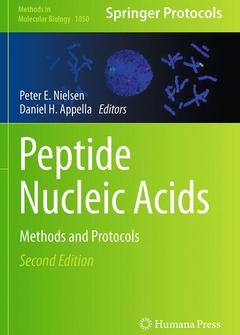Description
Peptide Nucleic Acids (2nd Ed., Softcover reprint of the original 1st ed. 2014)
Methods and Protocols
Methods in Molecular Biology Series, Vol. 1050
Coordinators: Nielsen Peter E, Appella Daniel H.
Language: English
Subject for Peptide Nucleic Acids:
Publication date: 08-2016
Support: Print on demand
Publication date: 12-2013
239 p. · 17.8x25.4 cm · Hardback
Description
/li>Contents
/li>Comment
/li>
Exemplifying and illustrating recent exciting advances in PNA chemistry, the second edition of Peptide Nucleic Acids: Methods and Protocols serves as a vital complement to the first edition of the book. Since the discovery of peptide nucleic acids, many interesting new derivatives and analogues in terms of nucleic acid recognition specificity and affinity have emerged. Also, as this detailed volume presents, great ingenuity in exploiting the unique properties of PNAs for a wide variety of applications within drug discovery, medical diagnostics, chemical biology and nanotechnology has unfolded. Written in the highly successful Methods in Molecular Biology series format, chapters include introductions to their respective topics, lists of the necessary materials and reagents, step-by-step, readily reproducible laboratory protocols, and key tips on troubleshooting and avoiding known pitfalls.
Peptide Nucleic Acids: Methods and Protocols, Second Edition serves as a source of useful specific methods and protocols as well as a source of inspiration for future developments.
1. MiniPEG-gPNA
Arunava Manna, Srinivas Rapireddy, Raman Bahal, and Danith H. Ly
2. Cyclopentane Peptide Nucleic Acids
Ethan A. Englund, Ning Zhang, Daniel H. Appella
3. Chiral PNAs with Constrained Open-chain Backbones
Roberto Corradini, Tullia Tedeschi, Stefano Sforza and Rosangela Marchelli
4. Synthesis, Characterization and Evaluation of Radiometal-Containing Peptide Nucleic Acids
Holger Stephan, Christian Förster, and Gilles Gasser
5. Preparation of Metal-Containing Peptide Nucleic Acid Bioconjugates on the Solid Phase
Gilles Gasser
6. Formation and Characterization of PNA-Containing Heteroquadruplexes
Bruce A. Armitage
7. Sequence Selective Recognition of Double Stranded RNA using Triple Helix-forming Peptide Nucleic Acids
Thomas Zengeya, Pankaj Gupta, and Eriks Rozners
8. Assembly of PNA-tagged Small Molecules, Peptides and Carbohydrates onto DNA Templates: Programming the Combinatorial Pairing and Inter-ligand Distance
Nicolas Winssinger, Katarzyna Gorska, Mihai Ciobanu , Jean Pierre Daguer, and Sofia Barluenga
9. Site-selective Scission of Human Genome using PNA-based Artificial Restriction DNA Cutter
Kenichiro Ito and Makoto Komiyama
10. PNA Openers and their Applications for Bacterial DNA Diagnostics
Irina V. Smolina and Maxim D. Frank-Kamenetskii
11. DNA-templated Native Chemical Ligation of Functionalized Peptide Nucleic Acids – A Versatile Tool for Single Base Specific Detection of Nucleic AcidsAlexander Roloff, Simon Ficht, Christian Dose, and Oliver Seitz
12. Use of Peptide Nucleic Acids (PNAs) for Genotyping by Solution and Surface Methods
Stefano Sforza, Tullia Tedeschi, Mariangela Bencivenni, Alessandro Tonelli, Roberto Corradini, and Rosangela Marchelli
13. Analysis of PNA Hybridization by Surface Plasmon Resonance
Bruce A. Armitage
14. PNA Fluorescent in situ Hybridization (FISH) For Rapid Microbiology and Cytogenetic AnalysisHenrik Stender, Brett William, and James Coull
15. Rapid miRNA Imaging in Cells using Fluorogenic Templated Staudinger Reaction Between PNA-based Probes
Katarzyna Gorska and Nicolas Winssinger
16. Cellular Delivery of Peptide Nucleic Acids (PNAs)
Takehiko Shiraishi and Peter E. Nielsen
17. Peptide Nucleic Acid Mediated Recombination For Targeted Genomic Repair and Modification
Erica B. Schleifman and Peter M. Glazer
18. Antisense Effects of PNAs in Bacteria
Shan Goh, Jem Stach, and Liam Good
Fully updated version of the popular first edition
Includes detailed, step-by-step protocols
Features notes on troubleshooting and avoiding known pitfalls
These books may interest you

Peptide Synthesis and Applications 137.14 €



